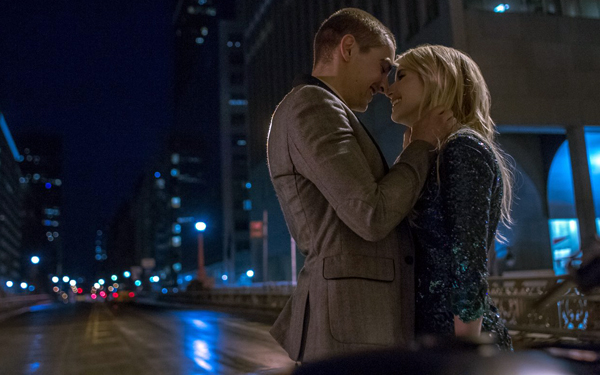She’s utilized her life experience in the American Horror Story writers’ room and delved into the emotional ups and downs of what it means to be a teenage girl in her many YA adaptations. Screenwriter Jessica Sharzer’s latest feature film is this summer’s thriller Nerve, starring Emma Roberts and Dave Franco. And still to come is 2017’s three-hour television remake of Dirty Dancing that she wrote for ABC.
Having made her feature writing and directing debut in 2004 with Speak, which starred Kristen Stewart and premiered at that year’s Sundance Film Festival, Sharzer has found much to love in writing YA in particular.
Creative Screenwriting chatted with Sharzer about the appeal of the YA market, opening up in the writers’ room, and the need for tenacity.

Emma Roberts as Vee in Nerve. Photograph by Niko Tavernise
Tell me about adapting Nerve for the big screen. Did you work closely with Jeanne Ryan?

Jessica Sharzer
The truth is, I’ve never met her! I think when she optioned the book, it was her first novel. I was not involved in those conversations, so I’m not sure how it all came about – but she wasn’t involved in the development of the screenplay.
That tends to be fairly standard. Inevitably, when you’re adapting a screenplay you’re going to make changes – some of which are big, some of which are small. Sometimes it’s hard for a novelist to let go of what they’ve written and look at it as a brand new entity. So it can be a common occurrence that the novelist just lets it go and lets the screenwriter run with it.
This was not your first adaptation of a YA novel, is that correct?
Yes, I’ve done several. My first movie was Speak, which was a very popular YA book by Laurie Halse Anderson. I wrote and directed that movie, with Kristen Stewart in the lead. That was almost my first job. My very first screenwriting job in Hollywood was another teen adaptation of a 19th century Russian novella called First Love.
So I tend to write a lot in the teen space. I recently adapted Dirty Dancing for ABC as a musical. And I also recently adapted a YA book called The Young Elites, by Marie Lu, for 20th Century Fox and a company called Temple Hill, who do a ton of YA material.

Halle Hirsh as Rachel and Kristen Stewart as Melinda in Speak
What do you like about writing for young adults?
I love writing YA and never get tired of it. I think the main reason is because it seems there’s never a time in your life when you feel things as intensely as when you’re a teenager. The joys and the pains and everything in between are so acute and it’s inherently dramatic.
There’s also an inherent tension to being a teenager, which is that you’re still a child but you want to be an adult. You want independence, but you also don’t want to be alone and you don’t want to be without some kind of tether to your family. So it’s inherently dramatic, it’s inherently filled with conflict…it’s really a matter of finding the specific conflict within the story.
But to me it’s also romantic, funny, sad, heartbreaking sometimes…it’s very emotional and the peaks and valleys are very extreme.
In that light, let’s look at Nerve’s protagonist, Vee. She had a different dynamic with every character in the film. Was there a particular relationship you enjoyed writing the most?
I loved writing the two girls who were friends. On the face of it, you look at these two girls and you say “they’re so different, why would they be best friends?” But I think there’s a kind of interdependency that they have and that they speak to it in their big fight scene. They need each other.
I think that that’s true of a lot of friendships, especially between girls in high school. There’s a codependency, for better and for worse. And I think the movie tries to address that, to a certain extent. In some ways the person that Vee is breaking away from the most in the movie is Sydney.

Dave Franco as Ian and Emma Roberts as Vee in Nerve
Tell me about your work on American Horror Story.
I loved it. It was the best job I’ve ever had, for sure. And it was a game-changer for me, both professionally and creatively.
I had only ever written alone up until that point, so it was a very new experience to collaborate on that level in terms of the writing. I was also working with people who were much better writers than I was. It was like an amateur tennis player playing against John McEnroe – it raised my game.
But it was also really important to check your ego at the door. Because the collective goal is more important than any one individual’s goal. When it comes to the vision of the show, obviously there’s a showrunner or creator at the top who’s going to really determine where it’s headed and what the tone is and all of those creative decisions. But everyone on the team needs to get on the same boat!
So that was both a creative lesson and a life lesson, about being part of a team. I didn’t play sports in high school, so hadn’t been a part of many teams in my life. It was very rewarding on a lot of levels.
Beyond collaboration, what else did you find made a writer good in the room?
It’s interesting. Putting together a writers’ room is a lot like casting a show, in the sense that it’s a big creative choice as to what voices and what experiences you put in that room. Those are the experiences that people are going to pitch from and draw from. You want a certain amount of diversity in a room, in terms of age, race, gender, and so on.
On that show in particular, Ryan Murphy wanted to skew the room older, which actually benefited me as I was relatively older coming into TV writing. Most people break into it in their 20s and I was not in my 20s anymore.
He wanted that because the subject matter of the first season was really adult. It was about a marriage falling apart, it was about infidelity, it was about having children. And so he very intentionally cast the room with people who had had those experiences, or some part of them.
I was really able to draw from my life experience and in a writers’ room, you have to be prepared to really expose yourself. Otherwise it’s not that creative. You have to be prepared to tell your most personal stories, and there’s a sort of understanding that what’s said in the room stays in the room. We get to know each other very, very well.

Denis O’Hare as Liz Taylor and Evan Peters as James March in American Horror Story. Photo by Prashant Gupta – © Copyright 2015, FX Networks. All rights reserved.
You mentioned that you recently adapted Dirty Dancing. Given the success of a series such as Stranger Things, which so clearly taps into our sense of nostalgia, how did you find the experience of rewriting this 80s classic?
It’s one of those things that’s a double-edged sword to get involved with, because everyone loves the original movie so much. It looms large in the collective memory of people my age – people of every age, really. But I was the target age when that movie came out and I loved it so much and identified so heavily with Baby.
As soon as it was announced that Dirty Dancing was being remade, there was an uproar on the internet. Which I completely expected and understand – and I expect that when the movie comes out there will be an equal uproar of people who are hate-watching it and who are picking it apart for not being what the original was! So it’s a very loaded project to get involved in.
That said, I just tapped into how much I loved it and tried to honor what the original was, as opposed to trying to do something new with it. I wanted to honor it and expand on it just slightly.
The mandate when I got the job was that they wanted the parents’ roles to be bigger and they wanted the sister’s role to be bigger. That was partly for casting purposes, but it was also partly to build out the story and tell a little more of the story. Not to change it, but to say who these characters are and what they want. What are they dealing with in their personal lives?
That was really an exciting challenge to me because I wanted to stay within the lines of what the original was without messing it up. But I found that there were a lot of scenes in the historical time period of the summer of ’63, right before Kennedy was shot and during the beginning of the Civil Rights, anti-war and women’s movements…there was so much change going on at that time so there was a lot to draw from. That was where these expanded stories went.
I’m really happy with how it turned out and think it’s a really beautiful tribute to the original.

Patrick Swayze as Johnny Castle and Jennifer Grey as Baby Houseman in Dirty Dancing (1987)
You’ve worked in feature films, television series, TV movies…is there one medium you prefer over another?
I love both film and television. To me, writing is writing.
What I love about television is that writers are really appreciated in a different way. The writer really sets the stage and determines where the show is going.
In movies, it really is a director-driven medium. That can be a wonderful thing, especially if you are working with really talented directors – they’re taking your work and amplifying it and building it and adding to it. So it’s not a negative thing, it’s just that that’s the way it’s set up to work.
So I would say at this point I’m focused a little more on television, because to me the idea of creating a show that I can run that is a world I can create and a family that I can put together, both in front of the camera and behind it seems really exciting to me.
What advice would you offer our readers?
I would say the biggest factor in determining a screenwriting career – especially one with any kind of longevity – is tenacity. Obviously talent is important, but tenacity is of equal or greater importance. Because there’s a lot of disappointment and rejection along the way, even in a success story. For every job I’ve had, there have been ten other jobs I didn’t get.
You need to love it enough and be prepared to have the door close in your face quite a lot. And there will be lean times when you aren’t making the money and when you have to take jobs that you wish you didn’t because you need to keep the lights on in your house. You need to love the process of writing enough that it can sustain you through those harder times. I had many years that were like that.
But TV and the internet are opening up avenues for a lot of new voices. There are all of these shows on Hulu and Netflix and Amazon…YouTube has become a platform for people to launch careers as well. It’s a pretty exciting time actually, because it’s democratizing the process and allowing people who have no access to Hollywood or film school to have a voice in the marketplace. That to me is really exciting.
Featured image: Dave Franco as Ian and Emma Roberts as Vee in Nerve. Photograph by Niko Tavernise.
[addtoany]

